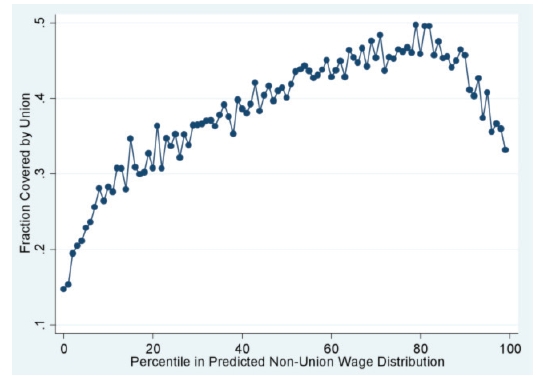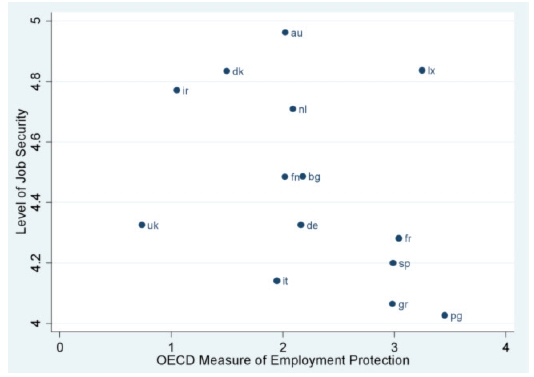 This month saw the recent announcement by unions of a new wave of public sector strikes planned for November over public sector pension plans. Alan Manning argues that unions have become an increasingly problematic way to deliver the progressive agenda, as they tend to be composed of those who deliver public services rather than those who receive them. Smarter labour market regulation, aimed at the redistribution of wealth, may be a better outcome than enhancing the power of the unions.
This month saw the recent announcement by unions of a new wave of public sector strikes planned for November over public sector pension plans. Alan Manning argues that unions have become an increasingly problematic way to deliver the progressive agenda, as they tend to be composed of those who deliver public services rather than those who receive them. Smarter labour market regulation, aimed at the redistribution of wealth, may be a better outcome than enhancing the power of the unions.
There is a continued need for smart regulation of the labour market – the financial crisis has made it clear that markets cannot be relied upon to deliver acceptable outcomes. This will likely have to be through legislation on individual rights rather than bolstering the power of collective bargaining and relying on unions to negotiate good outcomes.
Unions have become increasingly problematic as ways to deliver the progressive agenda. Figure 1 shows the unionisation rate at different points in the wage distribution (the non-union wage distribution so this is not affected by the fact that unions may raise wages).
Figure 1: Union Coverage Across the Pay Distribution

Union coverage is now highest at the 80th percentile and higher at the 95th than the 35th. Union members are increasingly located in the public sector. That means they can be relied upon to support parts of the progressive agenda – those that require strong public services in education and health, and a redistributive welfare state with people to administer it. But that support is based on the fact that union members are those that deliver the services rather than those who benefit from them, and it is the latter group that progressives should care about. Sometimes these interests are aligned but that alignment is not automatic, a point illustrated, for example, by current disputes about public sector
pensions. Because progressives do need the state to achieve their objectives, they need to be more interested in making sure the state is efficiently run. Therefore they should be in favour of a small but effective state.
In what areas of the labour market do we need more regulation? There is one area that stands out though it is hard to think of a magic bullet to produce the desirable outcome: we do need to find a way to allow workers to achieve a better balance between work and family life. We need to find a way for more and better jobs to be available on a part-time basis – perhaps through a more effective limit on the hours people work.
There are also areas where we do not need more regulation. The current crisis has led to an increase in job insecurity and it is tempting to respond to that by restricting the ability of employers to lay off workers. I think that would be a mistake. The countries (primarily in southern Europe) that responded to fear of job loss in the 1980s by protecting employment have not delivered a greater sense of job security, as Figure 2 shows.
Figure 2: The Relationship between Perceived Job Security and Employment Protection

Source: European Community Household Panel and OECD Labour Markets Database
The reason for this is that employment protection leads to a sclerotic labour market in which job loss is feared even more because the prospects of re-employment are so poor. This is not to say that Germany did not get it right in the current recession – it was the right thing to keep skilled workers in manufacturing industries in the belief that these companies were fundamentally sound. But, equally, one would not want to have maintained employment in the Spanish construction industry. The countries that have been most successful in creating a sense of job security are those that have actively sought to get back into work those unfortunate enough to lose their jobs.
It remains the case that much of the progressive agenda requires an active state to mitigate the effects of the market. In a recession like the current one, the resources available to the state are squeezed as the tax base falls and demands on the welfare state rise. But we must make sure that the state serves its fundamental progressive purpose –to redistribute wealth – and does not get captured by special interest groups. We should be simplifying the welfare state to make sure, as far as is possible, that the state does not tax with one hand and give out to the same people with the other, employing large numbers of people to administer the system.
Low support for the market economy
The current crisis and longer-run trends in the labour market present both constraints and opportunities for the progressive agenda. Constraints primarily because when real living standards are falling, people tend to hunker down and look after themselves rather than be inclined to consider the welfare of others less well off. But opportunities because the crisis has made it clear that unfettered markets have big problems and that the existing model of the market economy primarily only delivered benefits for the rich.
This article is an extract of one published in the Policy Network paper, Social Progress in the 21stCentury.
Please read our comments policy before posting.







